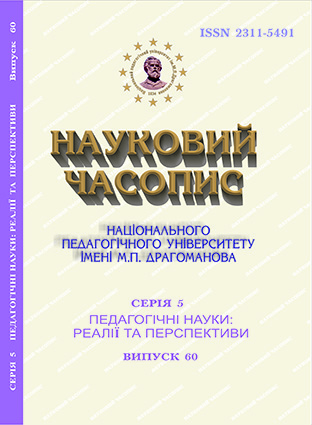PRINCIPLES OF DISTANCE EDUCATION
Ключові слова:
distance education, distance learning system, lifelong learning, principles, science-driven educational environment, students of technical universities, technical specialistsАнотація
The paper is devoted to the outlining of the main pedagogical principles of distance learning in technical universities dependable on a range of pedagogical and psychological conditions. The analysis of scientific literature showed the possibilities for bringing innovations and offering new methods and models in distance learning principles implementation. A brief overview of more specific concepts is given and their implementation in distance education for achievement of students’ professional aspirations is underlined. The role of distance learning in the system of higher technical education in science-driven conditions has been outlined, the main advantages and problems of students’ psychological characteristics relevant for consideration in distance education environment have been determined. The article outlines the main students’ pedagogical and psychological characteristics, which must be taken into consideration in the process of the principles introduction in the distance education at technical universities.Посилання
Bajtelsmit J. Study methods in distance education : A summary of five research studies / J. Bajtelsmit // M.G. Moore (Ed.), Contemporary issues in American distance education. – Oxford : Pergamon, 1990. – P. 181–191.
Boyd G. A theory of distance education for the cyberspace area / G. Boyd. In D. Keegan (Ed.), Theoretical principles of distance education (pp. 213–233). New York: Routledge.1993
Devlin T. (1993). Distance training. In D. Keegan (Ed.), Theoretical priciples of distance education (pp. 224–268). London and New York: Routledge.
Dillemans R., Lowyck J., Van der Perre G., Claeys C., &Elen J. (1998). New technologies for learning: Contribution of ICT to innovation of education (pp. 215–223). Leuven, Belgium: Leuven University Press.
Elias T. (2010, May). Universal instructional design principles for Moodle. International Review of Research in Open and Distance Learning 11(2), 111–113.
Harris J. (1998). Virtual architecture: Designing and directing curriculum-based telecollaboration. Eugene, OR: International Society for Technology in Education.
Jegede O. J., Fraser, B. J., & Fisher, D. L. (1995). The development and validation of a distance and open learning environment scale. Educational Technology Research and Development 43, 90–93.
Keegan D. (Ed.) (1993). Theoretical principles of distance education. London and New York: Routledge.
Keegan D. (1996). Foundations of distance education (3rd ed.). London, UK, and New York, NY: Routledge.
Komensky Ya. A. (1982) Izbrannye pedagogycheskye sochyneniya [Selected pedagogical compositions]. Vol. 1. Moscow. 656 s. [in Russian]
Maddux C. D., Johnson, D. L., & Willis, J. W. (1997). Educational computing: Learning with tomorrow’s technology. Boston, MA: Allyn & Bacon.
Mayer R. (2001). Multimedia learning. New York, NY: Cambridge University Press.
Means B., Toyama Y., Murphy R., Bakia M., & Jones K. (2009, June). Evaluation of evidence-based practices in online learning: A meta-analysis and review of online learning studies. Washington, DC: United States Department of Education.
O’Dwyer L. M., Masters J., Dash S., De Kramer R. M., Humez A., & Russell M. (2010, June). E-learning for educators: Effects of online professional development on teachers and their students[PDF document].Retrieved from http://www.bc.edu/research/ intasc/PDF/EFE_Findings2010_Report.pdf.
Potashnik, M., & Capper, J. (1998). Distance education: Growth and diversity. Washington, DC: World Bank.


